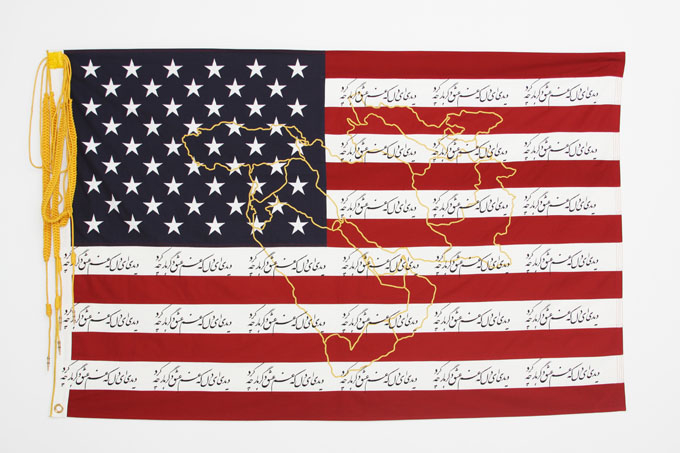
Sara Rahbar, Did you see what love did to us once again, Flag #32, 2008, 73 x 47 inches, mixed media.
Americans have spent a lot of time over the past couple months looking at the Iranian nuclear deal with labored skepticism and raised eyebrows. It seems that Obama finally has the votes he needs to secure the deal, but that may not stop congressional opposition from going forward with a “resolution of disapproval.” The opposition would have you believe that the deal is dangerous and Iran is not to be trusted.
Obama hit back, asserting that the deal is built on “unprecedented verification,” not on trust. Still, pundits say that Iran is in it only to pursue “nefarious goals” that will “sucker” the US and Europe into economic relations and put Israel at risk. After all, look at Iran’s shifty and power-grabby record. “We cannot let history repeat itself,” said the hawkish nonprofit Secure America Now, with panties in bunch. We can’t engage in diplomatic agreements with such an irrational entity. I mean, Iran? Are you kidding? They’re nuts.
Uranium enrichment is covered in the Nuclear Non-Proliferation Treaty as an “inalienable” right, a term we like because Thomas Jefferson used to throw it around.
But turn the tables for a moment: the United States has had its fair share of shady behavior. We might find reasons for Iran to fear getting involved with the United States. I mean, the United States? Are you kidding? We’re nuts.
First off, when it comes to history, perhaps Iran should focus on verification, not on trust. After all, we Americans have a terrible record in Iran of nosy meddling with touches of coup. In 1953 the CIA orchestrated a coup d’état against the popular, democratically elected prime minister of Iran, Mohammad Mosaddegh, because he wanted to nationalize Iran’s oil production so that more of the profit stayed in the country. There were riots, reportedly hundreds died, and the CIA installed the shah – an unpopular monarch within Iran, but liked by the CIA because he was a “weak reed” who “needed a lot of guidance,” useful qualities when keeping a country under your thumb, you know, so you can pursue your own nefarious goals.
All right, the Mosaddegh coup is decades-old history – the United States totally isn’t shady anymore. We’re rational actors! If anyone can be trusted on the international stage, it’s the United States. Diplomacy will always be the first order of action. It’s not like we would go into a war without good rea— Ugh! I can’t even finish that sentence, because the last decade has been overwhelmed by the least warranted war in American history, a war that violated the UN Charter. What’s the old adage? Countries that violate the UN Charter shouldn’t throw stones at countries attempting a nuclear deal?
But what about this: Iran has the right to enrich uranium under the Nuclear Non-Proliferation Treaty, to which it is a signatory – in fact, uranium enrichment is covered in the treaty as an “inalienable” right, a term we like because Thomas Jefferson used to throw it around. The US is also a party to the treaty, because theoretically we want there to be fewer nuclear weapons in the world.
But one of the United States’ closest allies – Israel – is actually not a party to the Nuclear Non-Proliferation Treaty. I hear you: Israel has to take precautions because some dingbats from the Iranian government have engaged in reprehensible anti-Israel rhetoric. But it’s also true that dingbats from Israel have engaged in some anti-Iran rhetoric and Israel probably has a nuclear weapon and it doesn’t believe in being a part of a treaty designed to curtail nuclear proliferation.
This is a match made in non-religion-specific heaven.
So if I were Iran, I’d be scared of entering into an agreement with a country with such nuclear-hungry besties. (Just a side thought: if we assume Israel has a nuclear bomb and Iran develops one, wouldn’t we all just continue to be in a mutually assured destruction scenario in which no one uses a nuclear bomb? PS: Pakistan already has one. PPS: So does India. PPPS: So does North Korea.)
Iran should really be leery of whether a treaty with the US even means anything anymore. Remember the 47 senators who almost totaled the entire negotiation by writing a letter warning the Iranian leadership that any deal might be trashed by a future administration? Iran might have some crazy-pants parliamentary officials, but at least they’re not sending passive-aggressive letters to foreign leaders telling them to stop negotiating with their executive branch. To the outside world, it’s anyone’s guess as to whether the executive branch even still has the power to negotiate. This deal could be here today, gone tomorrow.
Iran has plenty to be suspicious of, but after all this haranguing, we might find that it is actually a great ally for us in the Middle East. We’ve dug in our heels on Iran’s perceived differences when in fact Iranians are like Americans, only more tan. They’ve got an educated workforce – we’ve got one of those. They’ve got an overly religious wing of the government – hello, Republican Party. They’ve got a national obsession with plastic surgery – samesies. This is a match made in non-religion-specific heaven.
Iran has a boatload of problems, don’t get me wrong, but it’s a country with resources and a civil society. We could use an ally like that in the Middle East. Besides, we’re already fighting with Iran against Isis, so it’s about time we get to second base and go treaty with them, right?
This piece, commissioned by Creative Time Reports, has also been published in The Guardian.

